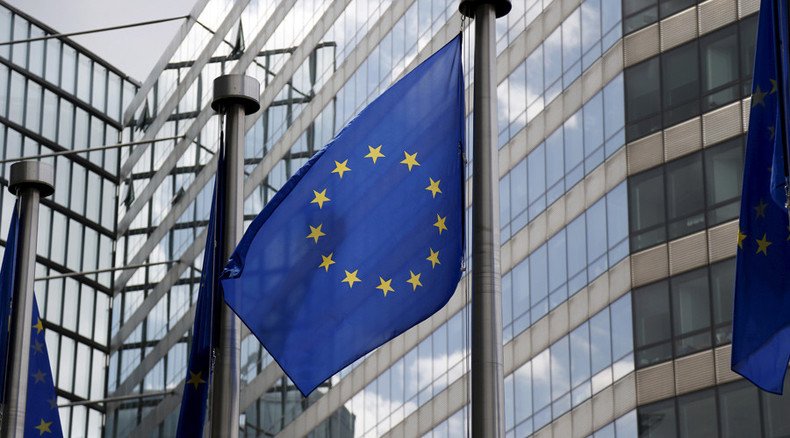Canada-EU trade deal that allows US firms to sue British govt sparks outrage

Campaigners gathered outside a secret court in central London on Friday to protest against a controversial EU-Canada trade deal that will empower corporations to sue the British government.
Known as the Comprehensive Economic and Trade Agreement (CETA), the trade deal is currently awaiting ratification. If approved, it will come into effect in 2016, signaling the elimination of 98 percent of tariffs between Canada and the EU.
The agreement will introduce a secret corporate court system, empowering big business to sue states for policies that threaten their profits. It will also pave the way for the privatization of public services and the deregulation of social, health and environmental protections.
#TTIP could hit you sooner than you think... through a backdoor called #CETA. This @campact video explains how http://t.co/0F4ahsxAFV
— CEO (@corporateeurope) September 24, 2015Central to CETA is an Investor State Dispute Settlement (ISDS), which will allow US corporations to sue the UK government if it acts against their interests. An updated version of this mechanism is also predicted to form part of a controversial EU-US trade deal known as the Transatlantic Trade and Investment Partnership (TTIP).
The ISDS mechanism, a contrversoal tool of international law, has led to mammoth pay-outs from governments worldwide as corporations wage legal battles against states.
In one particularly controversial example, US tobacco giant Phillip Morris took legal action against the Australian government after it introduced mandatory plain cigarette packaging. The firm is also embroiled in a $25 million lawsuit against Uruguay’s government in a bid to stop it from enlarging health warnings on cigarette packaging.
Press release: Civil society groups reject #CETA. http://t.co/w5r3TZ6I1e#NoTTIP#TTIP#ISDSpic.twitter.com/r2NQOAQb0h
— War on Want (@WarOnWant) September 25, 2015Social justice groups on both sides of the Atlantic are vigorously rejecting CETA, which was signed twelve months ago in Ottawa following secret talks between Canada and the European Commission (EC).
War on Want Executive Director John Hilary said opposition to the trade deal is rife across Europe.
“Almost 3 million people across Europe have signed the European Citizens’ Initiative saying no to CETA. The people of Europe have spoken and have made it clear they don’t want this deal,” he said.
“Just like TTIP, CETA is by and for big business. It will lead to the irreversible privatization of our public services and allow thousands of US corporations with offices in Canada to sue us in secret corporate courts.
“Anyone who is concerned about TTIP must also worry about CETA’s threat to our democracy.”
Trading away democracy: #CETA investment protection rules threaten public interest in Canada and the EU #ISDShttp://t.co/K0DbZ7IfY6
— CEO (@corporateeurope) September 25, 2015Linda Kaucher of StopTTIP UK said the ratification of CETA will carve a path forward for TTIP.
“While Investor State Dispute Settlement (ISDS) provision in TTIP has had most public focus, CETA also has ISDS and will be a back door for TTIP,” she said.
Kaucher, a high profile campaigner and academic, warned that the ISDS would have a “chilling effect” on regulation.
“US corporations will be able to sue EU governments, like that of the UK, via their Canadian subsidiaries, in secretive private ‘courts’ such as the London arbitration court,” she said.
Tim Flitcrot of noTTIP argued the UK government has already suffered serious losses as a result of secretive arbitration cases.
“The UK government has already paid out a £1 billion in compensation, via arbitration panels, after cancelling massive IT contracts when corporations have failed to deliver e.g. for an NHS IT system,” he said.
“While the failure to deliver and the cancelling of contracts has been public, the follow-up arbitration cases and the big pay-outs have been secret.”
Press release: Civil society groups reject #CETA. http://t.co/w5r3TZ6I1e#NoTTIP#TTIP#ISDSpic.twitter.com/r2NQOAQb0h
— War on Want (@WarOnWant) September 25, 2015Earlier this month, campaigners sharply condemned a European Commission (EC) proposal to create a new corporate court system to replace the ISDS mechanism.
The EC put forward a proposal for an alternative court system, a move it said would make the ISDS mechanism more transparent and allow states to appeal against multinationals’ legal challenges. But campaigners say the suggested changes are merely cosmetic, and would still allow corporations to sue governments in secret court settings.
Global Justice Now director Nick Dearden dismissed the EC’s proposed new court system as “a PR exercise.”
“The Commission can try to put lipstick on a pig, but this new proposal doesn’t change the fundamental problem of giving corporations frightening new powers at the expense of our national democracies,” he said earlier this month.
“Although a little more transparency is no bad thing, the real issue at hand here is that of corporate power.
“This change shows the European Commission is feeling the pressure of nearly three million people opposing TTIP and CETA – the two looming deals featuring ISDS.”












